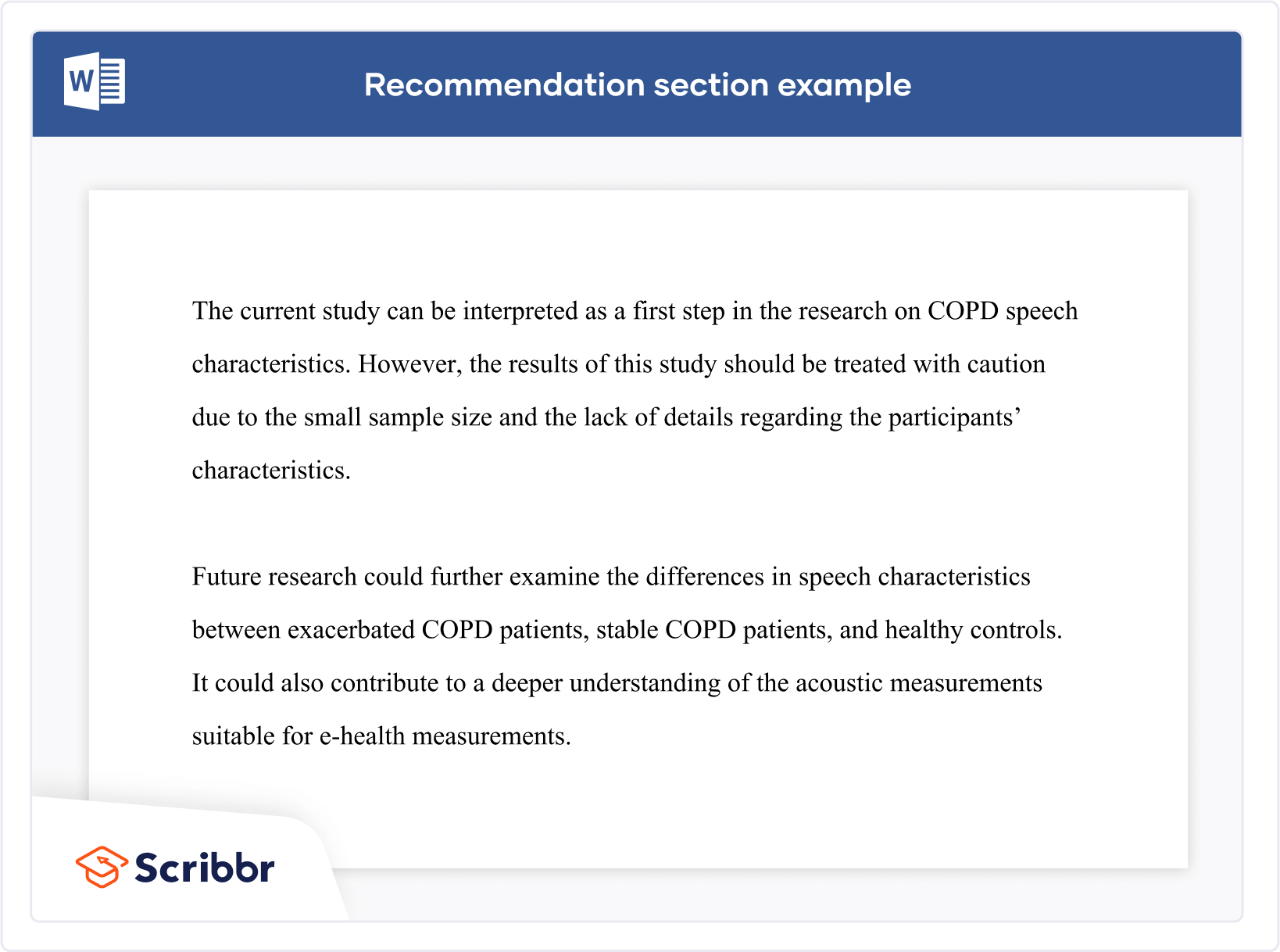How to Write Recommendations in Research | Examples & Tips
Recommendations in research are a crucial component of your discussion section and the conclusion of your thesis, dissertation, or research paper.
As you conduct your research and analyze the data you collected, perhaps there are ideas or results that don’t quite fit the scope of your research topic. Or, maybe your results suggest that there are further implications of your results or the causal relationships between previously-studied variables than covered in extant research.
What should recommendations look like?
Recommendations for future research should be:
- Concrete and specific
- Supported with a clear rationale
- Directly connected to your research
Overall, strive to highlight ways other researchers can reproduce or replicate your results to draw further conclusions, and suggest different directions that future research can take, if applicable.
Relatedly, when making these recommendations, avoid:
- Undermining your own work, but rather offer suggestions on how future studies can build upon it
- Suggesting recommendations actually needed to complete your argument, but rather ensure that your research stands alone on its own merits
- Using recommendations as a place for self-criticism, but rather as a natural extension point for your work
Building your research recommendation
There are many different ways to frame recommendations, but the easiest is perhaps to follow the formula of research question conclusion recommendation. Here’s an example.
How can teachers at your local preschool ensure that social skills that contribute to maintaining peer relationships are promoted in children aged 1 to 4?
Conclusion
An important condition for controlling many social skills is mastering language. If children have a better command of language, they can express themselves better and are better able to understand their peers. Opportunities to practice social skills are thus dependent on the development of language skills.
Recommendation
The investigation revealed that mastering language is an important prerequisite for mastering social skills. On this basis, future research should examine the ability of language development programs to expand the language skills of children aged 1 to 4.
How should your recommendations be written?
As a rule of thumb, try to limit yourself to only the most relevant future recommendations: ones that stem directly from your work. While you can have multiple recommendations for each research conclusion, it is also acceptable to have one recommendation that is connected to more than one conclusion.
These recommendations should be targeted at your audience, specifically toward peers or colleagues in your field that work on similar subjects to your paper or dissertation topic. They can flow directly from any limitations you found while conducting your work, offering concrete and actionable possibilities for how future research can build on anything that your own work was unable to address at the time of your writing.
Recommendation in research example
See below for a full research recommendation example that you can use as a template to write your own.
Other interesting articles
If you want to know more about AI for academic writing, AI tools, or research bias, make sure to check out some of our other articles with explanations and examples or go directly to our tools!
Frequently asked questions about recommendations
- Can I present new arguments in the conclusion of my dissertation?
-
While it may be tempting to present new arguments or evidence in your thesis or disseration conclusion, especially if you have a particularly striking argument you’d like to finish your analysis with, you shouldn’t. Theses and dissertations follow a more formal structure than this.
All your findings and arguments should be presented in the body of the text (more specifically in the discussion section and results section.) The conclusion is meant to summarize and reflect on the evidence and arguments you have already presented, not introduce new ones.
- What should I include in a thesis or dissertation conclusion?
-
The conclusion of your thesis or dissertation should include the following:
- A restatement of your research question
- A summary of your key arguments and/or results
- A short discussion of the implications of your research
- What doesn’t go in a dissertation conclusion?
-
For a stronger dissertation conclusion, avoid including:
- Important evidence or analysis that wasn’t mentioned in the discussion section and results section
- Generic concluding phrases (e.g. “In conclusion …”)
- Weak statements that undermine your argument (e.g., “There are good points on both sides of this issue.”)
Your conclusion should leave the reader with a strong, decisive impression of your work.
- What’s the difference between the discussion and the conclusion?
-
In a thesis or dissertation, the discussion is an in-depth exploration of the results, going into detail about the meaning of your findings and citing relevant sources to put them in context.
The conclusion is more shorter and more general: it concisely answers your main research question and makes recommendations based on your overall findings.
Cite this Scribbr article
If you want to cite this source, you can copy and paste the citation or click the “Cite this Scribbr article” button to automatically add the citation to our free Citation Generator.
George, T. (2023, July 18). How to Write Recommendations in Research | Examples & Tips. Scribbr. Retrieved April 15, 2024, from https://www.scribbr.com/dissertation/recommendations-in-research/




